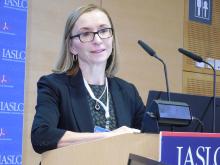VIENNA – Many lung cancer patients would like to work with their physicians to reach a shared decision about their care, but often feel inadequately informed to comfortably participate in the decision process.
Patient decision aids offer a way to address this knowledge and participation gap, Laurie E. Gaspar, MD, said in a video interview at the World Conference on Lung Cancer, sponsored by the International Association for the Study of Lung Cancer.
The video associated with this article is no longer available on this site. Please view all of our videos on the MDedge YouTube channel.
She and her associates have run an online survey that so far has received responses from 196 lung cancer patients, caregivers of patients, or significant others of patients. One hundred seventeen (60%) said that they faced a difficult management decision, but more than half these patients said they felt they had inadequate information to make their decision. The most popular form of decision making was a shared decision with their physician, favored by 73% of the respondents, but only about half the patients believed they had actually participated in a shared-decision process with their physician, reported Dr. Gaspar, professor of radiation oncology at the University of Colorado in Aurora.
“A majority of the patients felt there was a problem in not having sufficient information, and a majority want to make decisions in a shared way,” she explained.
Dr. Gaspar hopes to receive funding to develop new decision aids that can help patients better understand the benefits and risk of various management options. She believes that visual representation of the incidence rates of risks and benefits can help patients better comprehend concepts such as the relative risks that various options pose. “We’re not always successful in presenting information is a way that’s easy for patients to understand. Shared decision aids may help lung cancer patients make better treatment choices,” she said.mzoler@frontlinemedcom.com
On Twitter @mitchelzoler


